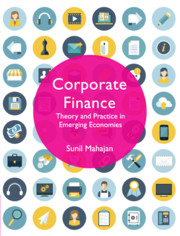Book contents
- Frontmatter
- Contents
- List of Figures
- List of Tables
- List of Corporate Snippets
- List of Abbreviations
- Preface
- Acknowledgements
- 1 Corporate Finance: A Conceptual Introduction
- 2 Financial Markets
- 3 The Time Value of Money
- 4 Capital Budgeting
- 5 Risk and Return
- 6 Valuation
- 7 Capital Structure and Financing
- 8 Dividend Payout: Policy and Practices
- 9 Leverage
- 10 Financial Derivatives
- 11 International Finance
- 12 Working Capital
- 13 Ratio Analysis
- Appendix
- Bibliography
- Index
6 - Valuation
Published online by Cambridge University Press: 30 April 2020
- Frontmatter
- Contents
- List of Figures
- List of Tables
- List of Corporate Snippets
- List of Abbreviations
- Preface
- Acknowledgements
- 1 Corporate Finance: A Conceptual Introduction
- 2 Financial Markets
- 3 The Time Value of Money
- 4 Capital Budgeting
- 5 Risk and Return
- 6 Valuation
- 7 Capital Structure and Financing
- 8 Dividend Payout: Policy and Practices
- 9 Leverage
- 10 Financial Derivatives
- 11 International Finance
- 12 Working Capital
- 13 Ratio Analysis
- Appendix
- Bibliography
- Index
Summary
What is a cynic? A man who knows the price of everything and the value of nothing.
—Oscar WildeThe objective of a company is value maximization. Valuation is the theme that runs through the entire gamut of corporate finance; understanding valuation is critical in order to understand corporate finance.
1. Fund managers and equity analysts determine the value of companies in order to take decisions on buying and selling equity shares. Valuation is the basis of equity research and portfolio management.
2. Valuation guides M&A transactions. Acquisitions are undertaken at a certain price; without knowledge of the company's value, it becomes difficult to price mergers.
3. Investment bankers value companies to arrive at the right price for an initial public offering (IPO).
4. Venture capitalists need to value business proposals for them to undertake an investment.
5. The management needs to know the right value of their own company to decide on stock repurchases (shares buyback).
6. And, of course, managers must understand valuation and its principles to be able to maximize value for their ultimate owners, namely the shareholders.
Valuation is an elusive concept which no one has been able to master. It is not a precise science. The speed of travel can be measured to a precise number. Genetic characteristics remain the same irrespective of the scientist studying them. If one valence of magnesium is combined with two valences of chloride, the outcome will always be magnesium chloride. Value is, however, different for different people and even to the same person at different points in time. Vincent van Gogh produced over 800 paintings. In his entire lifetime, he was able to sell only one of them—for US$25. Some years back, one of those unsold paintings was auctioned for US$66 million! Absolute value is a myth.
Beauty lies in the eye of the beholder. Similarly, value depends on how much the buyer is willing and able to pay. The proof of value is when the investors loosen their purse to spend cash and buy the security. Investors need to back up with money what they say with their mouth.
- Type
- Chapter
- Information
- Corporate FinanceTheory and Practice in Emerging Economies, pp. 148 - 175Publisher: Cambridge University PressPrint publication year: 2020



